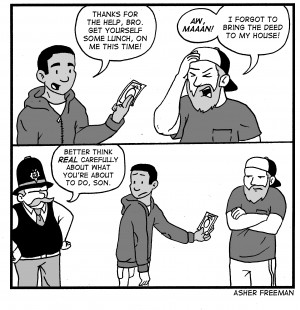 There is tension in San Antonio between some residents and Chief of Police William McManus over possible restrictions on giving to panhandlers.
There is tension in San Antonio between some residents and Chief of Police William McManus over possible restrictions on giving to panhandlers.
McManus’ proposition would further the goals of a 2011 aggressive solicitation ordinance that prohibits asking for things of value in certain areas such as bus stops and parking meters.
The goal, according to city council meetings in 2011, was to target “professional panhandlers,” people who support themselves by asking for money and also seem to have no apparent impairments keeping them from working.
Because professional panhandlers can at times aggressively ask for money when ignored, it is evident the purpose of the 2011 ordinance is to protect the public. However, the recent proposal to criminalize giving to panhandlers, which would be a class C misdemeanor if approved, does not protect the public. Instead, it serves as a tool to forcefully push the agenda of a few on citizens who are capable of making their own decisions about charitable giving.
The problem with the logic of criminalizing giving is rooted in the 2011 ban on panhandling which, according to San Antonio’s City Council, was created to protect people from aggressive begging. In cases of willingly giving, people are approaching panhandlers and the homeless, offering them food and money. The threat of aggressive panhandling has been removed. So why criminalize the givers?
According to an article in the San Antonio Express-News McManus addressed the city council Sept. 3 and said, “If it’s a crime to panhandle, it should be a crime to give to panhandlers as well.”
This is an interesting assessment, but McManus is wrong. If it is a crime to panhandle, then it is a crime to panhandle and that’s all there is to it. There are no derivatives of this ordinance. By McManus’ logic, if it is a crime to steal a television from a locked home, it is also a crime to voluntarily remove the television from your home and hand it to someone who wanted it. But in reality, that is not a crime, it’s called charity and charity should never be a crime.
It would seem that McManus and the law are driven by two separate goals and some in San Antonio are aware that this legislation is taking things a step too far. According to the San Antonio Express-News, Councilman Joe Krier, a member of the Public Safety Committee, said he would not back this proposal.
“I’m not inclined to unnecessarily regulate citizens’ freedoms,” he said. “One of those freedoms is to give away money. And another of those freedoms is to say no.”
Hundreds of San Antonians are doing just that, saying no, but they’re saying it to McManus. Through a petition using the change.org site, 639 are asking McManus to other council members to drop the proposed ordinance. According to the petition, 4,361 signed petitioners are needed. For the sake of simple liberties, they will hopefully reach this goal soon.
Never mind the fact that for some giving to panhandlers or homeless people on the street is a reflection of one’s faith and living out scripture like Proverbs 19:17, which reads, “Whoever is generous to the poor lends to the Lord, and he will repay him for his deed.”
A religious argument on this issue, or even an argument based on the inhumanity of attempting to mute the needs of others and create class systems, is too controversial to build a solid ground on.
This is an argument of free speech and the threat it is facing. Money is one of the greatest forms of expression. It’s how people buy the election posters they plant in their yards and it is how others contribute to fundraisers for candidates in elections.
For some, donating money to a candidate who will fight homelessness is enough. For others it isn’t and the act of handing a dollar to man on the street is an expression of a civil liberty.
It’s also a kind act that can sometimes change the course of a human’s life. Frankly, it would be criminal to make that a crime.



